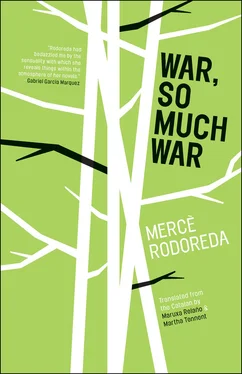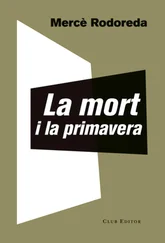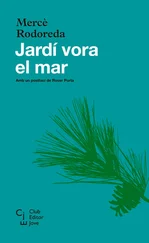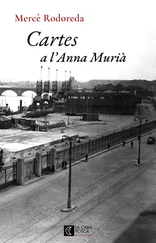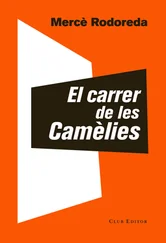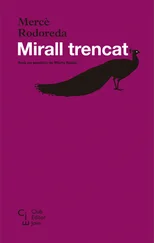THE DOWNPOUR HAD ENDED, BUT RAINDROPS CONTINUED TO FALL from trees and everything was shrouded in fog. Here and there, a tree trunk or shrub emerged from the milky whiteness, like a surprise. I was assailed by the smell of earth, the smell of decay from rains that had fallen on the leaves of countless autumns. The landscape changed; the gorse had been replaced by fern, and the terrain sloped. I heard the fluttering of bird wings. I sat down on a damp, moss-covered rock by a pond with rippling water. Perhaps one day — if I died near this spot where I had paused to sit — a hunter or a wanderer like myself would find, instead of the carcass of a wild animal, my own remains. With the tip of his boot he would unearth a bone, and beneath it would be an ant colony or a centipede’s nest or perhaps a worm that would coil in desperation at being discovered, at having its entire world dismantled. A skittish sun was beginning to pierce through the mantle of fog. I should have been like that patch of sunlight, oblivious to whether young boys gazed at it or not, unconcerned that it might find itself severed from the world by the fog. I ran my hand over my cheek: The fuzz was thick. I would become a man with coarse hair on his face, and the veins that had previously been hidden would show. The patch of sunlight deepened in color, and the fog began to hasten past, unraveling as if it were smoke from an unseen fire.
A flock of black ducks with dark blue patches on their foreheads waddled into the water and hurriedly came out again. Two of them, the ones closest to me, took flight. Soon the entire flock followed. The lake was slowly emerging from the shadows. Kneeling on the rock, I scooped a few handfuls of water, washed my face, and drank. When the ripples had scattered and faded, the water became a mirror. In it I saw reflected my head with cropped hair. That face, with no hair falling across the forehead, did not seem my own. For a long time I looked into those eyes, not because they were eyes, and my own, but because of everything they held within them, because of everything they had seen. My heart gave a start. The fear that had visited me the day before as I traversed the forest had returned. I closed my eyes to hide from myself. If I did not see my reflection, it meant that I was not there, that that fear was not there. . Go home. . I opened my eyes. In the water, beneath my face, I saw another face just like my own, with that same birthmark on the forehead. The lips moved as though uttering words I could not hear. The eyes hardened. I leaned forward trying to make out the words. . and the words that had eluded me and that I wanted to hear became intelligible. . Go home. Everything will be lost if you do not go back. . everything is still the same as you left it. Go back. The corner with the thatched roof to protect the camellias from the winter frost is the same; the reservoir filled with water for irrigation, with its flowering water plants swaying, the same; the spot at the end of the field, with the toolshed and the pile of neatly cut canes ready to be driven into the ground, to make trellises for the carnations that have not stopped flowering all summer — carnations and buds, buds and carnations — is still the same; the rosebush with the yellow climbing roses that will soon reach beyond the rooftop railing, the same; the good earth that is yours. . Come back! Come back! Your mother died calling your name. . Adrià. . Adrià. . come back. . come back. Round pebbles, egg-shaped pebbles, framed the face beneath my face, white, pink, dark, in the shifting sand.
The water in the lake was turning blue. The face beneath my face was slowly sinking, vanishing; only the eyes remained. A sudden ray of the strongest sun whisked them away to who knows what sands, who knows what roots. . go back, go back, go back, said the water. . go back. . go back.
HEY, KID, COME OVER HERE AND HELP ME. . A HUNDRED METERS away, a man was fishing. He was sitting on a folding stool. A satchel and a can full of worms lay at his side. I sat down next to him just as he leaned backward spinning a reel at the bottom of the rod, until out of the water sprang a small fish with the hook through its gills, wiggling furiously and flapping its tail against its mouth. He carefully removed it from the fishhook and returned it to the lake, just as Eva had said she did when she caught a fish that was too small. The fish became a faint shadow in the water. Hand me a worm. Careful not to squeeze it. He baited the fishhook and with a jerk of his arm cast the line as far as he could. What’s your name? Adrià. Adrià what? Adrià Guinart. He laughed. Like the outlaw? I laughed too, not fully understanding what he meant, and when I was about to tell him that I was lost, he said in a low voice — Quiet! or the fish won’t bite. I was distracted and didn’t realize that he had caught a fish until he hurled it at me. Put it inside the satchel. It was slimy in my hands. It had a round, velvety tongue, slick, short. When he had caught half a dozen more, he stopped. He asked me to take the satchel, disassembled his rod, and headed behind some trees where he had parked a white car that seemed to be made of iron. Get in.

The house was wooden, surrounded by tall, old trees. Inside was a large room with a bed in one corner and, on the right, a hearth embedded in a stone wall. Three or four terra-cotta pots full of tobacco pipes sat on the mantelpiece. There were two doors at the end of the room, one leading to the kitchen, the other to the shower. Light the fire. Here, some newspapers. From the wad of folded newspapers I extracted one, and just as I was about to tear it up to make balls to place under the firewood, I encountered an entire page of photographs and, at the top, in the center, standing in front of a wall covered with half-torn posters, was Eva. She was laughing, but her eyes were sad. The fisherman came out of the kitchen, and I scrambled to hide the page with her picture. Hand me a sheet of the newspaper. I finished building the fire and when I was putting a match to it, the fisherman called me to come and help him. The fish kept slipping through his fingers and he couldn’t cut them open. Grab it by the tail! Grab it with a dishrag! He placed them on a grill and cooked them over the fire. A cat that until then had not made its presence known brushed against my legs. It was dark grey, its eyes as blue as the fisherman’s. I couldn’t eat even one sad bite. The page with Eva’s picture was folded and tucked in my pocket. The fisherman puffed on his pipe, the cat ate the fish scraps. Now, time for a nap. I always sleep after lunch. You, too. He walked me to the kitchen and, through a door next to the one that led outside, we entered a shed filled with tools, sacks of potatoes, all kinds of tins, and apples that were strewn across the floor. You’ll sleep here, he said pointing to a workbench. Unclutter it. Wait, I’ll give you a few pillows for a mattress. When I had the pallet set up, I lay down on the worktop. Eva laughed but her eyes were sad. I heard the fisherman stirring in the living room and I hid the picture. Not an hour had gone by when he called me. Let’s go out, we’ll gather the wood I cut a few days ago. It was a clear afternoon, not a cloud in sight, the sky a wilted blue, a mountain to my right. See that mountain? The sun rises on the other side. A mystery lies at the foot of it. Let’s go.

We got in the car and headed for the mountain; it was quite high, parts of it covered with dark green trees, others studded with rocks. You see the pond at the foot? The car circled around and came to a stop. Get out. See that hole on the other side of the pond? Many years ago, a train was supposed to come through this part of the world, and the idea was to make a hole in the mountain to build a tunnel. The project started with great fanfare, but it didn’t get very far. Everyone started dying: first, the engineer, then the foreman, then another foreman. Then the workers. . they all started dying, not in accidents but from illnesses. They kept bringing in new workers. Until three or four of them, the ones tasked with filling the barricades with gunpowder, just went under, sank. One of them managed to escape with his life and recounted, crossing himself many times, that the earth had given way, plunging deep, deep. Half the mountain, he said, had sunk, swallowing up men and trolleys. The work was halted and the mountain was left as it is today, with the gaping hole at the foot of it, large and wide, as black as an ugly wound. But the curious thing is that the earth in front of the opening slowly began to sink, and the great horseshoe-shaped hollow that hugs the entrance of the cave began to fill with water, the origin of which no one has ever been able to determine. It’s a peculiar kind of water, thick and fetid green, sickening. No one has dared go in it and swim to the hole. If you throw a piece of wood or a branch in it, it doesn’t float, it eddies under. Watch. . we approached and stood two meters from the water; he picked up a piece of wood and flung it as hard as he could; it landed in the middle of the water and was immediately sucked under into a great, green whirlpool. The locals wove a legend: Before the place became a sinkhole, it had been a cave where a girl who was being pursued had once sought refuge. On many nights, they said, she could be heard singing. I have come here many an evening, at different hours, and on all manner of nights — foggy, windy, hot, gelid, moonlit — and I have never heard a girl singing. But legends are beautiful and they help pass the time. Let’s go. We headed to the forest to collect the tree trunk and branches that had already been chopped. We’ll transport the wood at our leisure and tomorrow we’ll stack it inside the shed. There should be enough for a good two months.
Читать дальше
